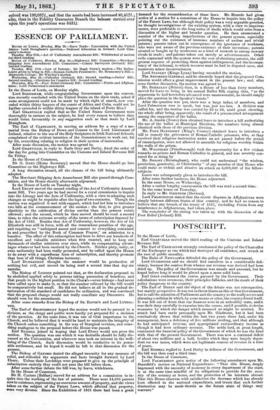POSTSCRIPT.
Is the House of Lords,
Earl GRANVILLE moved the third reading of the Customs and Inland Revenue Bill.
The Earl of CARNARVON strongly condemned the policy of the Chancellor of the Exchequer as one which had destroyed all confidence, and struck at the root of public morality.
The Duke of Nzwcas'rnz defended the policy of the Government.
Lord OVERSTONE said we should find ourselves in a considerable defi- ciency, because the sources from whence our revenue was derived had been dried up. The policy of the Government was unsafe and unsound, but he hoped before long it would be placed upon a more solid basis.
Earl GREY condemned the course pursued by the Government. Their calculations were erroneous, their principles fallacies, and the result of their policy dangerous to the country.
The Earl of DERRY said the object of the debate was not retrospective, but mainly prospective. It was not to throw blame on this or that Government, but to call the attention of Parliament and the country to the really severe and alarming condition in which, by some means or other, the country found itself. It was felt out of doors that our finances were in an unhealthy state, audit was their duty carefully to examine into the causes, and if possible, to devise measures by which the danger which menaced us might be averted. No attack had been made personally upon Mr. Gladstone, but it had been conclusively shown that within the last two years there had, under his management, been a deficiency of five millions sterling, and that although he had anticipated revenue, and appropriated extraordinary income as though it had been ordinary revenue. The noble lord, at great length, contrasted the financial policy of the Government of which be was the head with that of the present Government. There was now a continual deficit of about two millions and a half, besides which they were largely depen- dent on war taxes, which were not legitimate sources of revenue in a time of peace.
Earl RUSSELL replied to Lord Derby in defence of the Government, and the bill was then read a third time.
In the House of Commons,
Lord PALMERSTON gave notice of the following amendment upon Mr. Stansfeld's motion on National Expenditure: "That this House, deeply impressed with the necessity of economy in every department of the state, is at the same time mindful of its obligations to provide for the secu- rity of the country at home, and the protection of its interests abroad. That this House observes with satisfaction the decrease which has already been effected in the national expenditure, and trusts that such further diminution may be made therein as the future state of things may warrant."






























 Previous page
Previous page